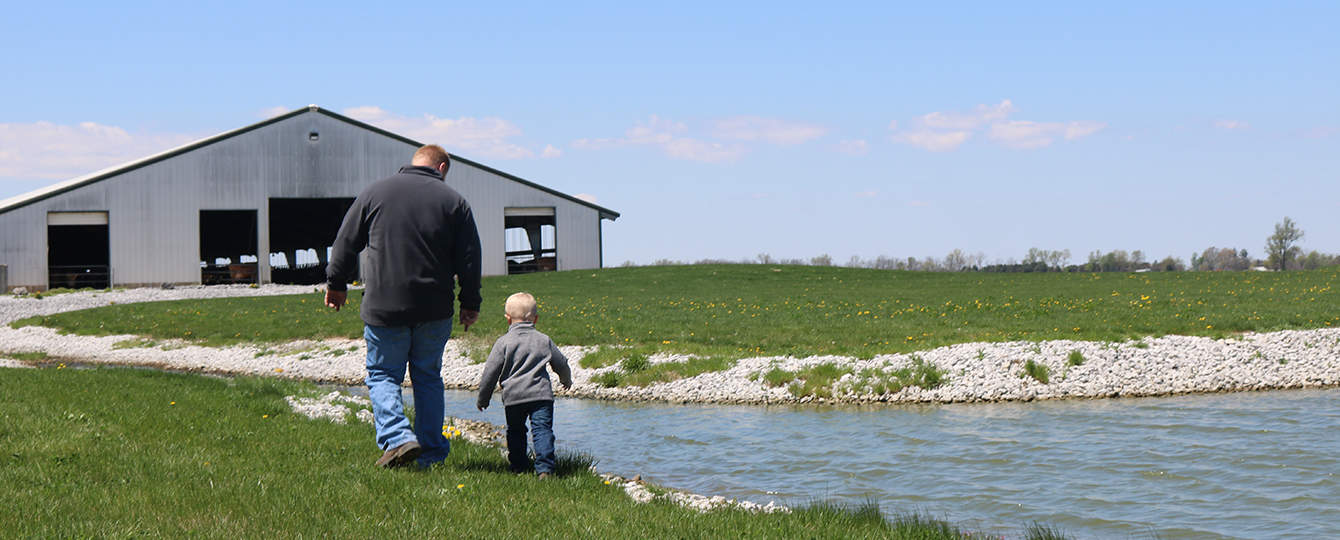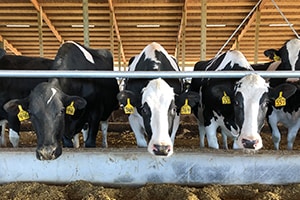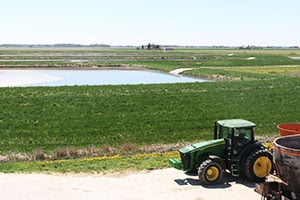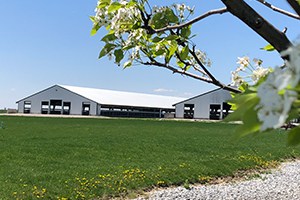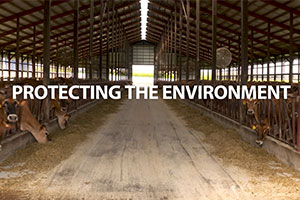Farmers are the original environmentalists! They continue to innovate on how they can protect our planet’s natural resources using sustainable agriculture practices. Why? Dairy farming is a family affair, and dairy farmers want to leave their land in good condition for the next generation.
Dairy farmers rely on science, innovation and efficiency to run their farms efficiently while protecting the environment. Environmental stewardship encompasses a wide range of topics, from the soil that grows crops for animal feed to greenhouse gas (GHG) emissions and resource recovery.
Shrinking Carbon Footprint
Due to innovative practices in cow comfort, improved feed and genetics, and modern barn design, the environmental impact of producing a gallon of milk in 2017 shrunk significantly, requiring 30% less water, 21% less land and a 19% smaller carbon footprint than it did in 2007. But that’s not all. The U.S. dairy community accounts for only about 2% of U.S. GHG emissions and is dedicated to doing more. By 2050, U.S. dairy will achieve greenhouse gas neutrality while improving water use and quality. That’s the vision: dairy as an environmental solution.
Innovative upcycling is also helping dairy farmers leave a smaller environmental footprint behind. By-products from food and fiber industries like citrus pulp and cottonseed are included in cows carefully balanced diets and converted to milk rather than sent to landfills, thanks to cows’ unique, 4-chambered stomachs. Many farmers also use old, worn-out car tires as weights to secure the plastic that preserves their crops after harvest or to help weigh down their calf hutches. It’s also common for farmers to clean and reuse the sand they use for bedding their cows.
Respecting and Recycling Water
Do dairy farmers care about water quality? Absolutely! They live on or near the land that they farm, and their families drink the same water. Therefore, they have a vested interest in making sure the water is clean and of the highest quality.
Many farmers conserve water by fertilizing the soil with cow manure, which increases the water-holding capacity of soil by up to 20%, resulting in reduced groundwater needed to grow crops. Federal, state and local clean water laws regulate how manure is applied on cropland, so nutrients are absorbed by crops, not groundwater. One way dairy farmers protect nearby streams, rivers and lakes is by planting buffer strips of thick heavy grasses and plants on crop fields to prevent manure runoff. Dairy farmers may also install catch basins to keep manure out of streams and the water supply. In addition, state and local government agencies regularly inspect and test the water on dairy farms.
Dairy farmers use water responsibly and often recycle it to use on their crops or to clean their milking parlors and barns. Most dairy farms recycle water an average of 3 to 5 times! For example, water used to wash the milking parlor each day can be captured and reused to flush manure away in the barns, then recycled again to irrigate crop fields.
Managing Manure
Dairy cow manure is a local, natural fertilizer that returns critical nutrients to the soil to nourish future crops that all farmers can use. One cow produces about 17 gallons of manure each day. That’s enough fertilizer to grow 46 pounds of corn! So, what do farmers do with all that manure?
Farmers remove manure from their barns to temporary storage, which can include a pit, tank or holding pond until it can be used for fertilizer. Dairy farmers are required by law to keep detailed records about many aspects of the farm, including how they store and recycle manure.
When the weather and ground conditions are right, manure can be spread on crop fields as a natural fertilizer, according to detailed nutrient management plans. These plans take into account the types of soil on the farm, the terrain of the fields, soil moisture levels, and the amount of nutrients the next crop on that field will need.
Alternatively, some dairy farms use anaerobic digester systems to manage their manure. These systems convert manure into clean, renewable electricity, which can power their farms, their homes and their community. Other dairy farmers are also using dried manure as bedding for their cows! It might sound gross, but manure-separating technology actually removes water from the manure, making it a clean and dry bedding that cows love.
